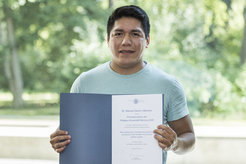Dr. Manuel Osorio Valeriano receives PhD award from Philipps-Universität Marburg
The university recognizes the IMPRS student`s excellent PhD thesis on the mechanisms of genetic inheritance in bacteria
With the “Promotionspreis”, Philipps-Universität Marburg recognizes outstanding dissertations from the University`s various disciplines. In 2021, five young researchers were honored with the award. One of them is Dr. Manuel Osorio Valeriano from the research group of Max Planck Fellow Martin Thanbichler.

“I am extremely honored to receive the Promotionspreis”, says Manuel Osorio Valeriano. “And I'm very grateful to my supervisor Professor Martin Thanbichler for always supporting me and guiding me, also to all our collaborators who provided valuable ideas and data, and to my colleagues for the friendly interaction and for pushing me to do my work the best I could.” For Manuel Osorio Valeriano, the International Max Planck Research School (IMPRS) played an important role during his PhD. “The IMPRS gave me the opportunity to interact with other groups within the Max Plnack Insitute and some of these interactions later developed into fruitful collaborations which provided valuable input to my project.”
Manuel Osorio Valeriano`s PhD work provided new insights into the mechanisms of genetic inheritance in bacteria. When a cell divides, it must duplicate its DNA and ensure that each daughter cell receives a full set of genetic information. In many bacteria, the segregation of DNA depends on a tripartite system known as the ParABS system.
The researcher found that one of its components, the ParB protein, uses an uncommon cofactor (CTP) to form a kinetochore-like complex at the centromeric region of the target DNA molecule which serves as docking point for the DNA segregation machinery.
Nucleotide regulation of protein function is a common theme in biology, involved in multiple cellular process, however, ParB represents the first class of CTP-depent molecular switches known so far.
Especially the community of young researchers and scientific mentors was beneficial. “The IMPRS workshops allowed me to learn new methods some of which I used for my work. The seminars organized by the grad school were always a great opportunity to present my research and I always got interesting questions and ideas – and the events organized or supported by the IMPRS were an excellent way to combine science with social activities which also had a positive impact in my PhD journey.”












